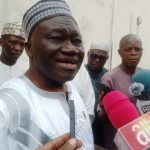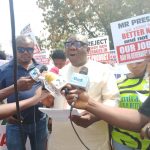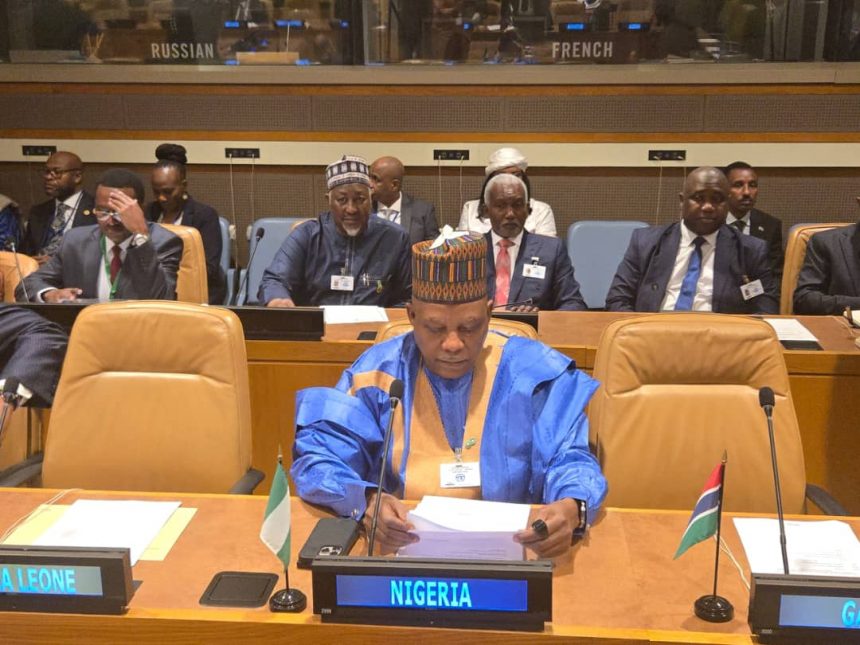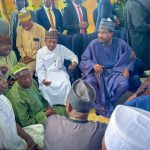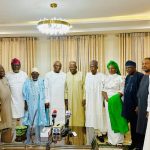Nigeria Reaffirms Commitment to Continental Peace as Vice President Shettima, Ministers Attend African Union Peace and Security Council Meeting in Angola.
By Bala Salihu Dawakin Kudu Democracy Newsline Newspaper
September 24, 2025
Luanda, Angola– In a demonstration of Nigeria’s unwavering commitment to peace, security, and regional stability across Africa, a high-level Nigerian delegation led by Vice President Senator Kashim Shettima, GCON, participated in the Meeting of the African Union Peace and Security Council (AUPSC) at the Heads of State and Government level on Wednesday, 25th September 2025.
The meeting, hosted in Luanda, Angola, by His Excellency João Lourenço, President of Angola, brought together African leaders and top officials to deliberate on pressing security challenges facing the continent, including the rising threats of terrorism, unconstitutional changes of government, transnational crime, and humanitarian crises in conflict zones.
Joining the Vice President were two prominent members of President Bola Ahmed Tinubu’s cabinet: the Honourable Minister of Defence, H.E. Mohammed Badaru Abubakar, CON, mni, and the Minister of Foreign Affairs, Dr. Yusuf Maitama Tuggar. They were accompanied by other senior Nigerian officials and diplomats, forming a formidable delegation that underscored Nigeria’s strategic role in shaping Africa’s peace and security architecture.
In his address to the Council, Vice President Shettima reaffirmed Nigeria’s historic role as a leading voice for peace and integration in Africa. He called for collective action against the rising wave of violent extremism, the resurgence of military coups, and the proliferation of arms across conflict-prone regions.
> “Africa cannot afford to regress into cycles of instability. We must protect the democratic values that generations of Africans have fought for. Nigeria remains fully committed to working with sister nations and the African Union to build a more peaceful, secure, and prosperous continent,” he stated.
The Vice President also stressed the need for strengthened regional cooperation, greater investment in peacebuilding mechanisms, and enhanced capacity for early warning and rapid response systems within the African Peace and Security Architecture (APSA).
Speaking on the sidelines of the meeting, Defence Minister Mohammed Badaru Abubakar emphasized the importance of strategic defence partnerships and robust military cooperation among African nations. He highlighted Nigeria’s counter-terrorism efforts, particularly in the Lake Chad Basin, and offered to deepen bilateral and multilateral defence collaborations.
> “Peace is not just a diplomatic pursuit — it must also be defended with the right capabilities. Nigeria is ready to share its experience, support peace operations, and help build a continental security structure that protects African lives and values,” the Minister said.
Meanwhile, Foreign Affairs Minister Dr. Yusuf Maitama Tuggar reinforced Nigeria’s diplomatic stance on respecting national sovereignty, rejecting unconstitutional regime changes, and ensuring that peacekeeping operations are guided by African-led solutions.
> “African problems require African solutions — but more importantly, they require African unity,” he said. “Diplomacy, dialogue, and development must go hand-in-hand to resolve conflicts sustainably.”
The meeting, convened under Angola’s chairmanship of the Peace and Security Council, marked a pivotal moment for Africa, as the continent continues to grapple with overlapping security and humanitarian crises in the Sahel, Horn of Africa, Central Africa, and parts of West Africa.
President João Lourenço, in his opening remarks, called for a renewed African consensus on peace, urging leaders to prioritize political stability, economic development, and institution-building as the bedrock of lasting peace.
Nigeria’s strong presence and active participation at the meeting served as a bold reaffirmation of its leadership role on the African continent. As Africa confronts complex threats in a rapidly changing geopolitical landscape, the country continues to position itself as both a protector of peace and a champion of regional integration.
The high-level engagement in Angola not only projected Nigeria’s voice on the global stage but also sent a clear message: Africa’s future must be secured by Africans, for Africans. And Nigeria, as always, stands ready to lead that mission.



